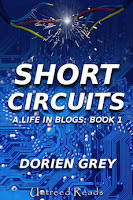Like almost everything else in my life, I do not respond to emotions in the way most people do. For the most part, emotions run roughshod over me. I tear up to music, and to anything I consider truly touching or sad…or joyous. I “wear my heart on my sleeve,” as they say, and I puddle up at the most inopportune moments. But interestingly, while my emotions feel free to run my life—especially anger, rage, and frustration—they refuse to respond when I really want them to. I seem to have a built in “kill switch” within me, which totally ignores me when I want to show them.
With every single curtain call of Matthew Bourne’s Swan Lake, which I’ve now seen ten times, I rose to my feet with the rest of the audience and wanted nothing more than to shout my approval as many others were doing. But I could not. Clapping wildly was as far as my emotions would let me go. At any number of public events, when the rest of the crowd is rocking back and forth, and waving their arms, I stand there. Just stand there. I want more than anything in the world to do as everyone else around me is doing, yet I cannot.
I weep, but I do not cry. My heart and soul respond, but my body refuses.
A friend just forwarded me a video of an English boy’s chorus singing “Going Home.” I watched it, knowing, in light of my friend Norm’s recent death, what my reaction would be and sure enough, with the first chords, I started to cry. “Started” being the operative word. I wanted to cry; I really did. I needed to cry…I needed a wracking, shoulders-shaking, uncontrollable, gasping for air cry, to wash out all the suppressed sadness and terrible sense of loss, not only for Norm but for all the losses of my life; for all the times I’ve wanted and needed so badly to really, really cry. But I couldn’t. Something inside my brain slammed the door shut on my emotions, and that was it. I stopped crying.
The last real, real cry I can remember was at the funeral of my beloved Uncle Buck, my mom’s brother. It was 1953 and I was in college. I got through the funeral with no problem until we got up to file past the casket. I didn’t make it to the end of our row before I literally fell apart. It was soul-wrenching, and I’ve not had another like it since.
When my dad died in 1968, as I was flying back to Rockford for the funeral, I wrote a eulogy for him, and the tears ran down my face, but I did not truly cry. I was in a public place. Crying is not permitted. Men don’t cry. (Of all the lessons our society teaches us, the inviolable rule that “men don’t cry” is without question one of the most foolish and inhumane ever conceived.) I am fascinated when I see men crying on the news. I empathize with their loss, while I envy their ability to do what I cannot.
When my mom died, I returned from the hospital and went on with my day. When my roommate/then partner came home, I told him in almost an “oh, and by the way” manner, and we had dinner and watched TV and went to bed. After a few minutes I got up and went into the other bedroom, and I cried. This was my mother, who I loved more than anyone else in the world. And yet even then the door soon slammed shut on my grief, trapping the tears inside, and try though I might, I could not reopen it.
When my “second mom,” Aunt Thyra…Uncle Buck’s wife…died in 1973, I don’t remember whether I cried or not. Probably a bit, but far more on the inside. I remember my cousin Tom, about 12 years younger than I, leaning against his car and sobbing uncontrollably. I felt for him. I understood him. But I could not join him.
To this day I have not really cried for Ray, whom I consider, through the softened light of time which blurs the sharp edge of reality, to have been the love of my life. Nor have I cried for Norm. I do wish I could.
---------------
This blog is from Dorien's ebook of blogs, Short Circuits, available from Untreed Reads and Amazon; it's also available as an audio book from Amazon/Audible.com:

















